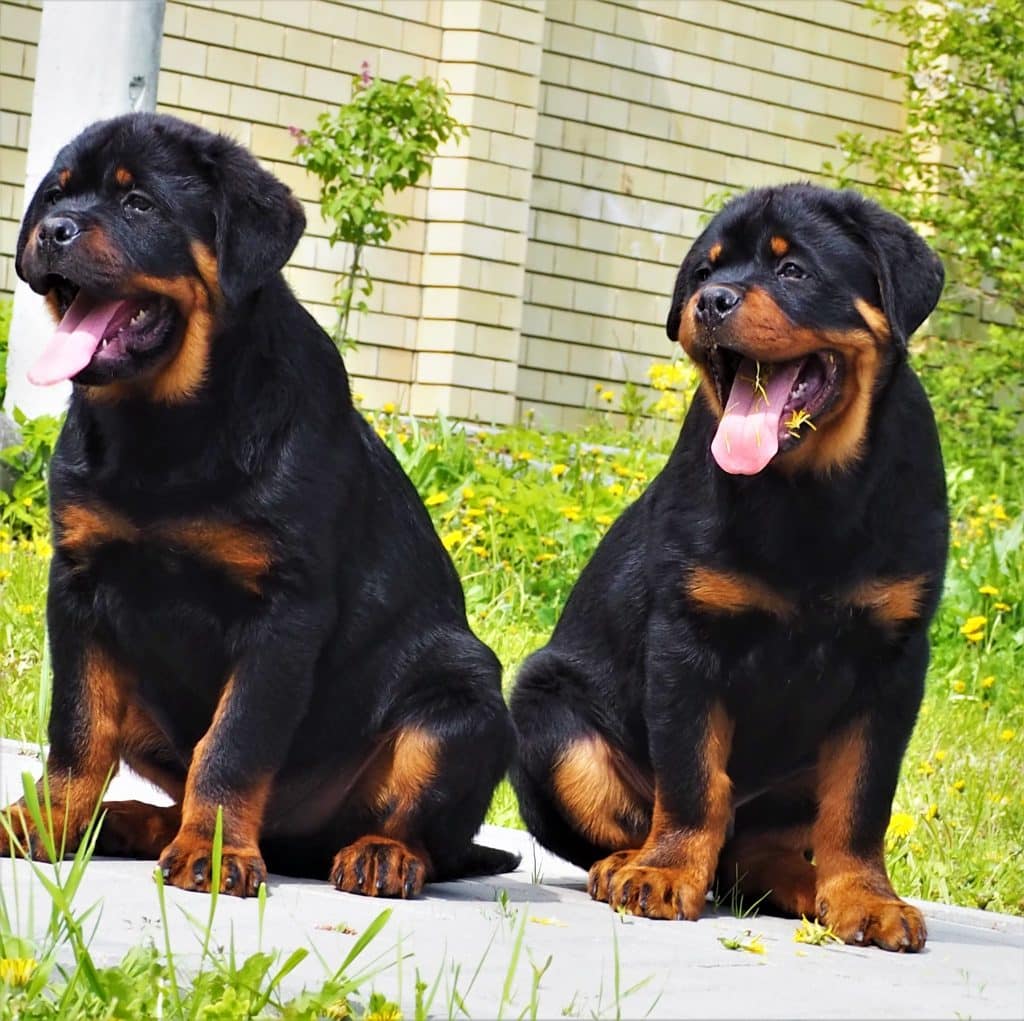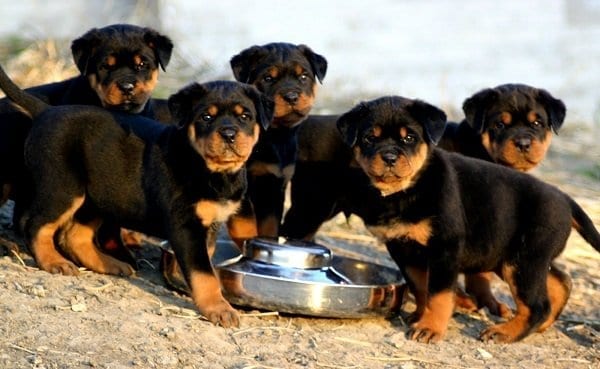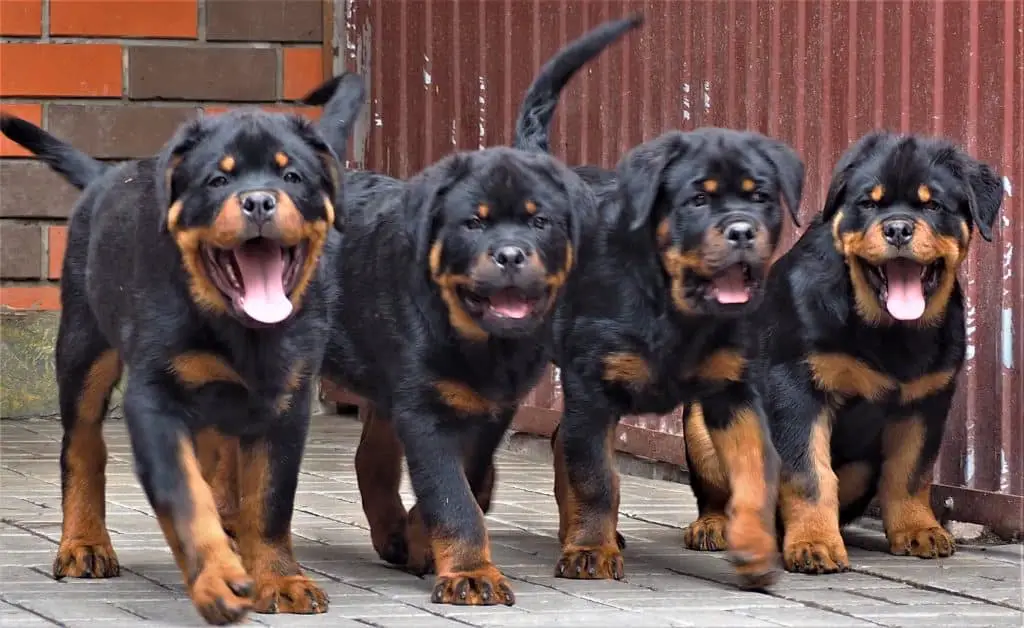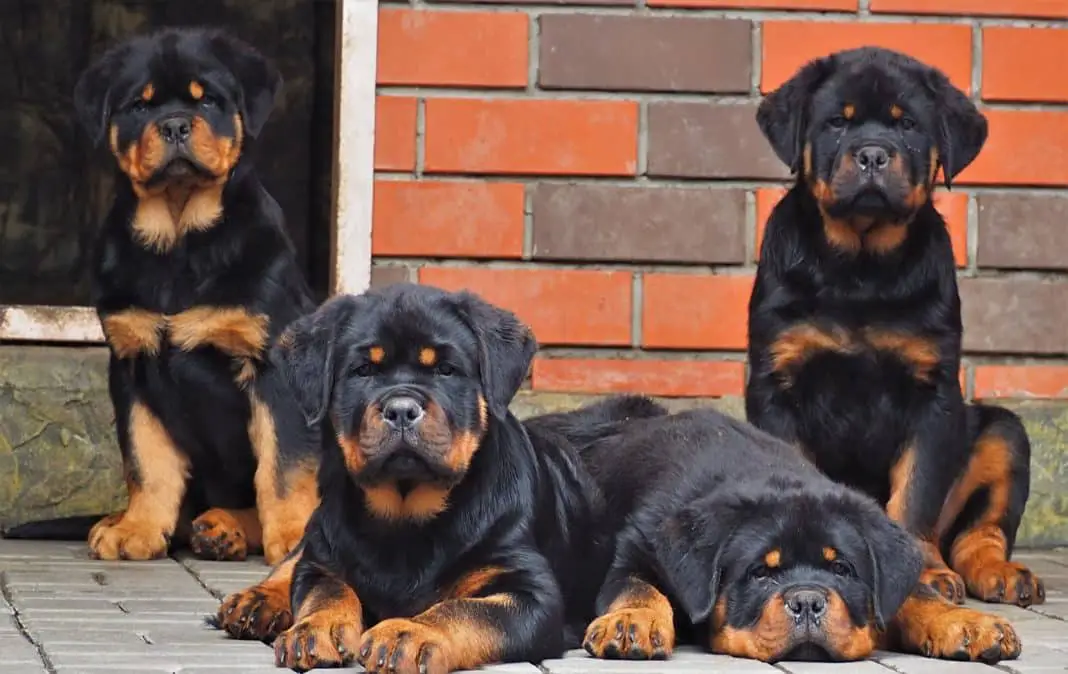Are you the proud parent of a brand new, absolutely adorable rottweiler puppy? Congratulations! You’ve chosen a wonderful companion known for loyalty, bravery, and love. Of course, you want to provide the best possible care for your new black and tan fur baby. Here’s what you need to know to raise a happy, healthy rottweiler puppy.
The Basic Needs of Your Rottweiler Puppy
 The basic needs of a rottweiler puppy are fairly straightforward:
The basic needs of a rottweiler puppy are fairly straightforward:
- High-quality, nutritious puppy food
- Proper veterinary care
- Housetraining and basic obedience training
- Plenty of exercise
- Socialization and companionship
- Shelter and clean water
- Lots of attention and love
Although their needs are fairly simple, raising a rottweiler puppy requires a lot of time and patience. Providing them with the necessary resources and medical care to keep them healthy can be a significant financial investment, too. Preparing yourself for the responsibilities of owning a puppy is crucial to your success, so let’s dive into the details of their care!
Choosing the Best Food for Your Rottweiler Puppy
 One of the first decisions you’ll make as the owner of a new rottweiler puppy is what food you’re going to feed him. There are lots to choose from, so how do you know which one is best?
One of the first decisions you’ll make as the owner of a new rottweiler puppy is what food you’re going to feed him. There are lots to choose from, so how do you know which one is best?
The first thing to know is that rottweilers grow very fast, but they mature slowly. This rapid growth can be tough on their joints, bones, and ligaments. Providing a high-quality, nutritious food that’s formulated for large breeds is crucial for their proper growth and development.
Rottweiler puppies should have a food that’s rich in vitamins and minerals, but not too high in calories. High-calorie food can make them grow too fast, which may cause health problems later in life.
It’s best to stay away from the cheap, generic brands at your grocery store. Look for a reputable brand of puppy food that doesn’t contain fillers, chemicals, and additives that could lead to food sensitivities and allergies.
Before you make a final decision, run it by your vet, just to make sure the puppy food you choose meets the special nutritional needs of rottweiler puppies.
Tips for Potty Training Your Rottweiler Puppy
 Housetraining is a crucial issue for any new puppy owner. Puppies aren’t born knowing where the supposed to go to the bathroom, so it’s up to you to teach them.
Housetraining is a crucial issue for any new puppy owner. Puppies aren’t born knowing where the supposed to go to the bathroom, so it’s up to you to teach them.
Teaching your rottweiler puppy to poop and pee outside should start right from day one. Dogs are creatures of habit. Don’t let bad habits become the norm because you’ll have a much harder time retraining your puppy later.
Using a crate to train your puppy can be a huge help, and many puppies learn to love their crate and think of it as their own personal safe place. Puppies don’t like to potty where they sleep, so this method is highly effective.
Consistency is key. Your new puppy should be taken outside every two hours, day and night. He should also go out after he eats and after he wakes up from a nap. Take him outside immediately if he seems to be looking for a place to go. Anytime you can’t supervise him, he should be in his crate.
If your new puppy does have an accident in the house, don’t punish him for the behavior. That will just teach him to hide when he needs to go. You’ll have a lot more success if you offer praise and treats when he goes to the bathroom outside.
Veterinary Care for Your New Rottweiler Puppy
Providing the best veterinary care for your new rottweiler puppy is a huge responsibility. Thankfully, there are some very simple steps you can take to help ensure your new family member stays healthy.
Once you’ve chosen a vet, make an appointment for your puppy’s first vaccinations. Staying up to date on shots is key for preventing several life-threatening illnesses, so this should be one of your top priorities when you bring your puppy home.
Much like human babies, a puppy’s immune system is still developing, so they’re especially vulnerable to contagions. In general, puppies should have their first shots when they’re about seven weeks old, with two more rounds given at three-week intervals.
Most vets recommend that every puppy is vaccinated against rabies, parvovirus, distemper, hepatitis, leptospirosis, and parainfluenza. Your vet may recommend additional vaccines if there are other contagious diseases common in your area.
Bond Vet NYC spay/neuter services also recommend spaying or neutering your rottweiler to prevent unwanted behaviors and potential health issues, including cancer later in life. However, large breed dogs like rottweilers should not be neutered until they’re fully grown. Just be sure to have the procedure done before unwanted behaviors, such as urine marking, become learned habits that can be hard to break.
Be sure to consult with your vet about deworming and controlling other parasites like fleas, ticks, and mites, too. These are all crucial for keeping your rottweiler puppy healthy and happy.
Training and Socializing for Rottweiler Puppies

Your new little family member needs you to teach him how to be a well-mannered member of society. Rottweilers are extremely smart, but you still need to teach him right from wrong. Start by teaching him basic obedience like walking on a leash and sit, stay, and come.
While rottweilers are wonderful family dogs, they can be reserved around strangers. It’s extremely important that they’re socialized early in life and that the socialization continues throughout their lifetime. Be sure to expose your rottweiler to new people, smells, sounds, sights, and things regularly.
Rottweilers who aren’t taught basic obedience and aren’t socialized lack confidence. They can become nervous, timid dogs with anxiety issues, and in some cases, may even display fear-based aggression. Socializing your rottweiler throughout his life, starting in early puppyhood, is an easy way to make sure this never becomes a problem for your puppy.
Final Tips
When you’re training your rottweiler puppy, keep in mind that they are very sensitive dogs. Never use punishment or harsh words. Positive reinforcement will get you much further with these loving, eager-to-please pups. And, don’t forget that these little guys need lots of cuddles and playtime, too!


